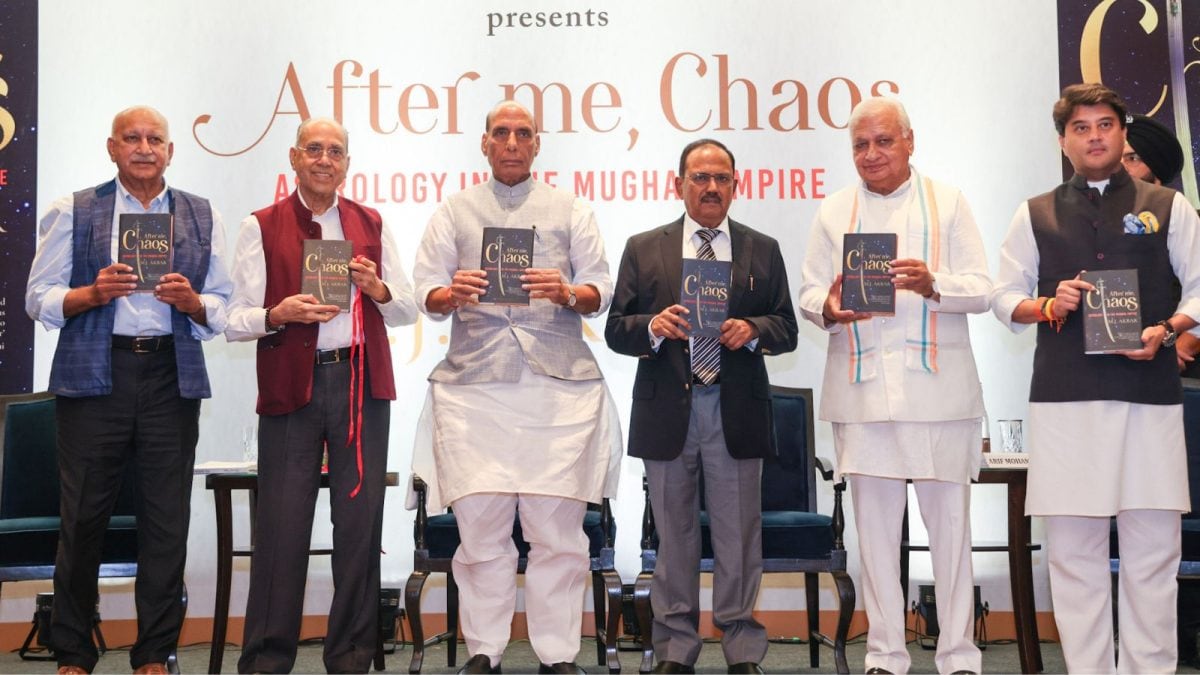Last Updated:
The book argues that the Mughal emperors’ faith in astrology was not merely a peripheral interest but a crucial aspect of statecraft

Defence Minister Rajnath Singh shared a picture from the book launch of ‘After Me, Chaos- Astrology in the Mughal Empire’, authored by veteran journalist and former Union minister MJ Akbar. (Image: @rajnathsingh/X)
Veteran journalist and former Union minister MJ Akbar on Monday launched his 12th book, After Me, Chaos: Astrology in the Mughal Empire.
The book challenges conventional historical narratives on astrology, arguing that the Mughal emperors’ profound faith in the subject was not merely a peripheral interest but a crucial aspect of statecraft.
Recommended Stories
Defence Minister Rajnath Singh, National Security Adviser Ajit Doval, Union minister Jyotiraditya Scindia, Bihar governor Arif Mohammad Khan, and former principal secretary to Prime Minister Narendra Modi, Nripendra Misra, were at the launch of the book in New Delhi.
Akbar’s book heavily draws from original sources like the Akbarnama and Tuzuk-i-Jahangiri, which suggest celestial guidance was integral to royal decision-making — from minor appointments to major military campaigns. He traces this belief system back to the pre-Islamic cultural lineage of the dynasty, linked to the bloodlines of Genghis Khan.
In an interview with News18, the author shared an intriguing part of his book, where he describes the birth of Mughal emperor Akbar.
“On the day Akbar’s mother, Hamida Banu, was due to deliver, the court astrologer Mawlana Chand, was present and consulting the celestial charts. He became extremely anxious because he determined that the time immediately approaching was highly inauspicious, a moment that might not be repeated for a thousand years. Mawlana Chand, the royal astrologer, was anxious when the inauspicious moment neared and, hence, a situation to shock the queen was created with the sight of an ‘ugly midwife’ which eventually caused a brief but providential delay, ensuring Akbar was born not in chaos, but in a far better time dictated by the heavens,” he told News18.
During the event, Doval praised the book stating it provides insight into how important decisions during the Mughal era were made after consultations with astrologers. He commended MJ Akbar’s exhaustive research and precise writing.
One of the book’s central revelations is emperor Akbar’s formal institutionalisation of astrology, creating the position of Jotik Rai, or the royal astrologer, a post held for a century by Brahmin pandits from Benares. These astrologers were richly rewarded, sometimes receiving their weight in gold and silver for accurate forecasts, highlighting the court’s reliance on their counsel.
Akbar recounted significant historical moments influenced by astrology. For example, he said, Humayun regained hope for the empire’s revival after receiving his son Akbar’s horoscope while he was a fugitive. Later, Akbar chose a critical military march against Kashmir in 1586 on the astrologer’s advice despite warnings from his commanders about the treacherous mountain passage, he added.
The book aims to resurrect an often-overlooked facet of Mughal history, illustrating how the interplay of politics, power, and the planets shaped one of the world’s greatest empires. It offers a fascinating new perspective on the rise and eventual decline of the Mughal dynasty.
October 07, 2025, 00:27 IST
Loading comments…
Read More



